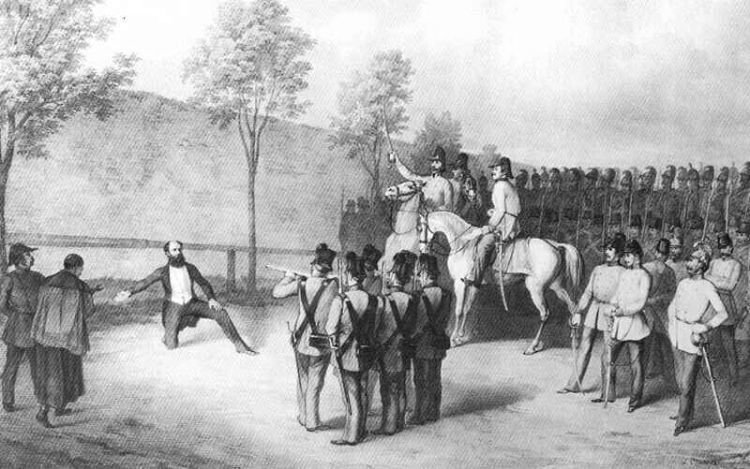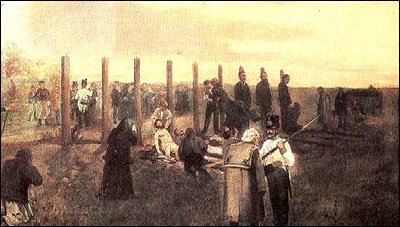Change language:
164th anniversary – The 13 Martyrs of Arad on October 6, 1849

The 13 Martyrs of Arad (in Hungarian: Aradi vértanúk) were the thirteen Hungarian rebel honvéd (military) generals who were executed on October 6, 1849 in the city of Arad, Kingdom of Hungary (currently in Romania), after the Hungarian Revolution (1848–1849) was ended by troops of the Austrian Empire and Imperial Russia, who reestablished Habsburg rule over the area. The execution was ordered by the Austrian general Julius Jacob von Haynau.
History
In a historic speech on March 3, 1848, shortly after news of the revolution in Paris had arrived, Lajos Kossuth demanded parliamentary government for Hungary and constitutional government for the rest of Austria. The Revolution started on March 15, 1848, and after military setbacks in the winter and a successful campaign in the spring, Kossuth declared independence on April 19, 1849. By May 1849, the Hungarians controlled all of the country except Buda, which they won after a three-week bloody siege. The hopes of ultimate success, however, were frustrated by the intervention of Russia.
After all appeals to other European states failed, Kossuth abdicated on August 11, 1849, in favor of Artúr Görgey, who he thought was the only general capable of saving the nation. On August 13, 1849, Görgey signed a surrender at Világos (now Şiria, Romania) to the Russians, who handed the army over to the Austrians. At the insistence of the Russians, Görgey was spared. The Austrians took reprisals on other officers of the Hungarian army.
The thirteen Hungarian generals were executed by hanging at Arad on October 6, 1849. On the same day, Count Lajos Batthyány (1806–1849), the first Hungarian prime minister, was executed in Pest at an Austrian military garrison.

Kossuth fled to the Ottoman Empire; he maintained that Görgey alone was responsible for the failure of the rebellion, calling him “Hungary’s Judas”. Others, looking at the impossible situation Görgey was given, have been more sympathetic. They have said that, given the circumstances, he was left with no option other than surrender.
One of the public squares contains a martyrs’ monument, erected in the memory of the generals. It consists of a colossal figure of Hungary, with four allegorical groups, and medallions of the executed generals.
Hungarians have come to regard the thirteen rebel generals as martyrs for defending the cause of freedom and independence for their people. Not all the generals were ethnic Hungarians, but they fought for the cause of an independent and — for its age — liberal Hungary. Arad is remembered on October 6th as a day of mourning for the Hungarian nation.
The generals
Arisztid Dessewffy (1802 – 1849)
Ernő Kiss (1799 – 1849)
Ernő Poeltenberg (1814 – 1849)
György Lahner (1795 – 1849)
Ignác Török (1795 – 1849)
János Damjanich (1804 – 1849)
József Nagy-Sándor (1804 – 1849)
József Schweidel (1796 – 1849)
Károly Knezich (1808 – 1849)
Károly Leiningen-Westerburg (1819 – 1849)
Károly Vécsey (1807 – 1849)
Lajos Aulich (1793 – 1849)
Vilmos Lázár (1815 – 1849)
If you respect the 13 Martyrs of Arad
Don’t clink your beer mugs!
Legend has it that while the revolutionary leaders were being executed, Austrian generals were drinking beer and arrogantly clinking their beer mugs together in celebration of Hungary’s defeat. Hungarians thus vowed never to clink glasses while drinking beer for 150 years thereafter. There is no explanation for the specified timeframe of 150 years. Although theoretically discontinued on October 6, 1999, in practice, this tradition still continues today. Throughout Hungary, the clinking of beer mugs or bottles was considered to be in bad manners.
Source: wikipedia








